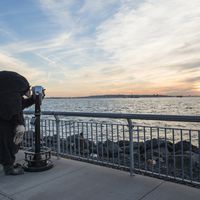Backup Films: Engineering in Film Financing
SEA-Images meets with Olivier Aknin of Backup Films to talk about their activities of film financing. Backup Films participated in search of financers and the production of Tropical Malady, the acclaimed piece by Thai director, Apichatpong Weerasethakul.
| Mr Aknin, can you tell us about Backup Films and its activities?Backup Films is a company that we created nearly 4 years ago. It is an international financing agency for films. We represent film producers on the basis of chosen projects, and we accompany and assist them in search of international funds. We are based in Paris, and we work on French, Asian, European, and American projects. We look for funds abroad for French projects, and in turn, France can be an international source of financing for foreign projects. |
This kind of activity is quite original and new, isn't it?
Yes it is, since we are not producer, nor sales agent, nor distributor. It's an activity which didn't really exist before. Actually, that form of activity exists in the USA, but in a different way and with different goals. In the States, there are lawyers who represent producers on finished films: they look for a distribution solution for both domestic and international markets. But they don’t work on the project at the financing stage.
In our case, we operate differently: We start to work on and follow a project from the moment there is a script, a producer, and some basic, initial finance.
This kind of activity is very new, and it already proved its utility with some films which could be made, not entirely thanks to us, but surely faster with our collaboration.
What are the types of films you chose to work on?
Our force is that we are composed of 4 associates with very different tastes and desires, so we can cover a wide range of films. Of course, those which attracted us the most have been auteur films. We also work on films with a larger potential and more commercial ones, but which are independent. The good thing is that these commercial projects allow us to have a better knowledge of some financing tools, which can be used for the benefit of more independent projects.
How would you evaluate your four years of activities?
Around 15 films on which we worked have been completed so far. It goes from the most independent one, with a very low budget - the perfect example in this case is Tropical Malady by Apichatpong Weerasethakul - to bigger, but still independent films with a cross-over potential such as Live and Become (directed by Radu Mihaileanu, presented at the Berlin Film Festival 2005). I can also mention a coming animation project with a budget of 15 million euros or a romantic comedy set in Italy with Harvey Keitel. We have also just set up a tax-based investment fund, which will start operating in January 2006. But it will only target French-qualified films in accordance with French fiscal legislation.
Can you explain a little more concretely what you did for the production of Tropical Malady?
Before this film, Apichatpong Weerasethakul was a director noticed in some festivals with Blissfully Yours. His profile was more attached to modern art than cinema, with his exhibitions and installations in museum. He is a Thai director and was unable to find financing in his home country since his style is completely different from the mainstream Thai cinema and the type of films that the Thai audience like. So the idea was to look for a system of financing in Europe, actually close to a patronage system.
The first step was to get a public partner, and we got the "Fond Sud".
This fund is given by those who represent the French film industry, which means that they want the chosen projects to be made. After that, we found partners in Germany and Italy, and we worked with these new partners to find financing in both countries. In Germany we were able to secure a regional film fund of "soft money"* under the condition that the postproduction should be done in that region. The Italian partner we had was a famous producer – Marco Muller, now the director of Venice Festival. He was the sole person capable of persuading RAI Cinema to participate financially in the film. We had also several subsidies and some advance money from the French distributor and the international sales agent. And finally, we found a private investor from Thailand, who completed the budget. Such a lot of partners!
This was a very particular project for us since it was us who found 100% of its financing. We do not usually work in that way. We did it because of our close relationship with Apichatpong Weerasethakul. Our usual way is to work with a producer, and not a director, who already has a source of financing from his home country, and we work with him to determine a financing strategy and to persuade the right partners in the right countries at the right time. And we make sure that all these sources of finance compatible with one another. We are remunerated by commissions based on the money that we find; we don’t ask for any upfront payment, we ask only for a success fee. Our goal is, of course, to be able to eat at the end of the month, but also to try to do something different and to contribute to the existence of the independent cinema. So it's not an easy job.
We are completely in a prototype economic system. Each project is different.
With some films, we can have a more specific mission. For example, we have to find 10 or 20 % of the budget from a specific country or territory. In other cases, our mission is to find 50% of the budget. It depends on the authors and their producer’s specificity. It depends also on which sources are available.
For the Raul Ruiz project, we found Italian, Spanish, Rumanian co-producers. The film was shot in Romania; we had Eurimages funds and a German sales agent for this French production.
So you have great expertise in the systems of regional, national and European financing, and especially the system of subsidies?
The regulations related to these funds change every day, so we have to update our knowledge regularly, both on their official and nonofficial aspects. And this, in order to know when is the good time, what is the good manner to present the right project to the right person.
Please tell us how you find all these projects.
All the cases are possible, from unexpected encounter to friends’ friends’ advices. One member of Backup, David Atlan-Jackson is specifically in charge of finding projects. He tries to figure out the situation of each country. We always want to remain open and study as many projects as possible. In average, we receive 30 scripts a month. But we limit the number of projects since these activities take a lot of time, and we don’t want to have projects that compete with one another for the same financing source. Sometimes, timing and chance are also important parameters.
Backup team, Olivier Aknin third from left
For more information and contact details, please visit Backup Films website at www.backupfilms.com
* For the definition of the term "soft money", please check the following link:
http://www.sharpangle.com/filmbusinessplans/filmfinancing.html
by Jérémy Segay
Similar content
posted on
06 Nov 2018
posted on
08 Mar 2011
from - to
06 May 2016 - 28 May 2016



